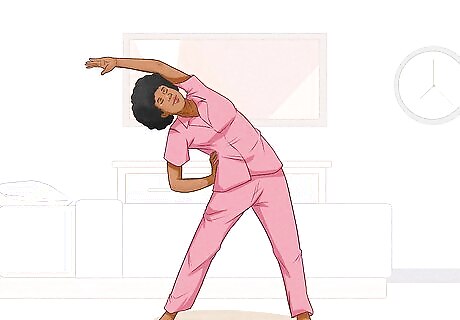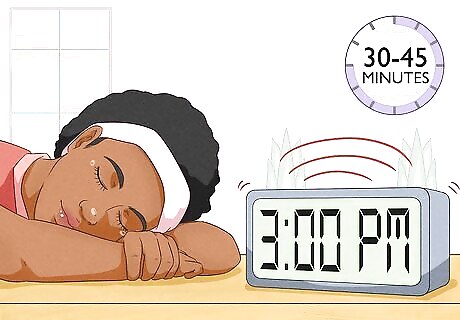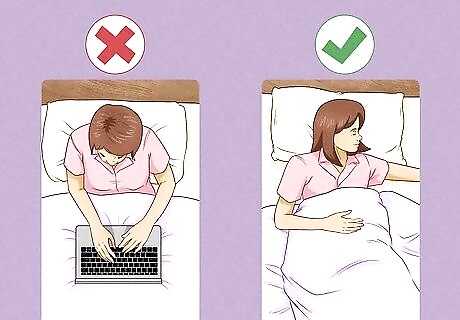
views
Encouraging Dreamless Sleep

Practice meditation to calm yourself into dreamless sleep. Deep meditation can help your mind relax and, as you drift off, encourage a restful sleep without dreams. Try meditating while going to sleep to increase the likelihood of deep, relaxed sleep. Meditation involves focusing your mind on a word, thought, or feeling to induce a stronger feeling of awareness or calm. Body scan meditation in particular is useful for lulling yourself to sleep at night. Try progressive muscle relaxation and deep breathing to reduce stress, which can trigger nightmares.

Do not pay attention to dreams after having them. Dwelling on dreams can make them reoccur in the future, either in themes or emotional significance. After waking up, try to distract yourself with work or other activities instead of ruminating on the dream. The less you pay attention to them, the more likely they are to fade over time. The exception to this is a nightmare, as exploring its significance may prevent it from recurring. Jot down notes about the nightmare after you wake up.

Wake yourself up with a timer while napping. If you're sleeping during the day and don't want to dream, set a timer for about 30-45 minutes. That way, you can wake up before you enter REM sleep, which is when you're most likely to dream. This method is less useful for dreaming at night, when your body needs REM sleep to feel restful the next day.

Talk to your doctor about taking a sleep medication if necessary. If you experience particularly vivid dreams, some medications can lower their intensity or frequency. Make a list of your dream symptoms and your medical history to discuss the best treatment plan with your doctor. Let your doctor know about any medications you're taking as well, as some can cause vivid or emotionally distressing dreams.
Preventing Distressing Dreams

Make your bedroom a comfortable relaxing place. To prevent nightmares, your bedroom should be used for one thing: sleeping. Avoid doing stressful activities, like work or resolving personal issues, in your room so you can go to sleep without feeling anxious. A soft, comfortable mattress and bedding can also help you relax and reduce emotional distress. The more emotionally troubled you are while going to sleep, the more likely you are to have a nightmare.

Sleep on your right side rather than your left side. Your sleep position can influence the quality of your dreams, and those who sleep on their left side are more likely to have nightmares. If you frequently experience nightmares, try sleeping on your right side for better dreams. Although people who sleep on their right side experience fewer nightmares, they also typically report a lower overall sleep quality.

Avoid spicy, carb-heavy, or sugary foods before bed. All of these foods can irritate your stomach and are more likely to cause weird or distressing dreams. If you feel hungry at night, eat something mild like cherries, rice, or sweet potatoes. Try not to eat heavy meals in general before bed, as too much food can irritate your stomach and cause restlessness or nightmares.

Try to understand the significance of your dream. After a distressing dream, assigning meaning to it can help you learn from it and overcome your nightmare. Think about what symbolism the dream could have in your life to better understand it and prevent recurring dreams. If you had a dream about failing your math test, for example, you might feel overwhelmed by the class. Talk to your teacher about ways to better manage your workload. Try searching the imagery on a dream dictionary site, if you can't figure out what it means.

Rehearse recurring nightmares to resolve them. If you struggle with recurring nightmares, try to picture it in your head and go through the scenes in your mind. Before you get to the climax of the nightmare, tweak the nightmare's events in a way that changes and resolves the frightening situation. Keep a dream journal and rewrite the ending to your nightmares. You can even read aloud the dream with the new ending before bed to take control of the story. If you have a recurring dream that you realize you're only wearing your underwear at work, for example, imagine yourself realizing that you're underdressed in the car and changing into work clothes before you get there.

Talk to a counselor if nightmares are affecting your sleep. If you deal with insomnia or anxiety as a result of your nightmares, you may need professional help to overcome them. Schedule an appointment with a counselor or therapist to reduce your nightmares over time. Schedule an appointment with your doctor as well, as some sleep disorders and medications can cause frequent nightmares.
Getting More Restful Sleep

Avoid consuming caffeine, alcohol, or nicotine before bed. Caffeine, nicotine, and alcohol can all irritate your nervous system and disrupt your sleep cycle. Try not to consume any of them at least 5-6 hours before you want to fall asleep. If you do consume any of these in the evening, try not to ingest them on an empty stomach as this can strengthen their effect on your body.

Plan physical activity into your weekly schedule. Regular physical activity can strengthen your overall wellness and promote more comfortable sleep. Aim for at least 2-3 exercise sessions that last between 30-60 minutes each week, especially on nights where you want restful sleep. Try not to plan physical activity any later than 1-2 hours before bed, however, as this can stimulate your body and make you feel more restless.

Stick to a regular sleep schedule. Try to go to bed and wake up at around the same time every day. This will train your body to fall asleep faster at night without as much tossing and turning. The recommended amount of sleep per night is 7-8 hours per night. Try to get approximately this much to stay healthy and rested.

Cut out all electronics before bed. Brightly lit screens can trick your brain into thinking it's morning and interrupt your sleep cycle. Turn off all electronics in your room at least an hour before you go to bed for more restful sleep. If you have an alarm clock in your room, use an analog clock instead of a clock with a backlit screen if you have trouble sleeping.




















Comments
0 comment